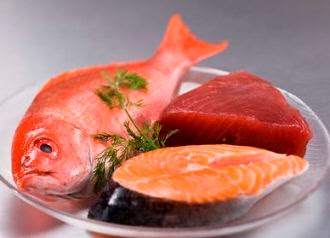The Gist
Mercury consumption—most often from fish—by pregnant
women may be associated with an increased risk for attention deficit
hyperactivity disorder (ADHD) in their children, a new report published online by Archives of Pediatrics & Adolescent Medicine suggests.
But the report also suggests that fish consumption itself may be
associated with a lower risk for ADHD, as the omega-3 fatty acids found
in fish help stimulate brain development. This finding points to the
need for discretion in fish choice during pregnancy. As ADHD affects up
to 12 percent of children worldwide and is associated with hyper,
impulsive behaviors, the study's findings are increasingly relevant to
pregnant women, parents, and doctors alike.
Expert Take
"This
study and a flurry of new evidence linking environmental contaminants
with ADHD reinforce the urgency of revising the regulatory framework for
environmental contaminants and toxicants,” writes Dr. Bruce Lanphear,
M.D., M.P.H., in an editorial appearing alongside the report.
Alongside growing awareness about the dangers of mercury as well as the benefits of eating fish, experts are calling for increased regulatory action to help protect pregnant women. Improving scientific research and policy could potentially result in outcomes such as mercury-level labeling or diet counseling in the OBGYN's office.
In the meantime, though, it is clear from this and other reports that reducing exposure to mercury and increasing consumption of mercury-safe fish is likely to help pregnant women lower the risk of their children acquiring ADHD and increase the brain-developing effects of safe fish that contain high levels of omega-3 fatty acids.
Alongside growing awareness about the dangers of mercury as well as the benefits of eating fish, experts are calling for increased regulatory action to help protect pregnant women. Improving scientific research and policy could potentially result in outcomes such as mercury-level labeling or diet counseling in the OBGYN's office.
In the meantime, though, it is clear from this and other reports that reducing exposure to mercury and increasing consumption of mercury-safe fish is likely to help pregnant women lower the risk of their children acquiring ADHD and increase the brain-developing effects of safe fish that contain high levels of omega-3 fatty acids.
Source and Method
Researchers
examined data from a group of 936 infant participants born between 1993
and 1998 in New Bedford, Massachusetts, looking at fish intake and hair
mercury levels of their mothers, as well as ADHD behaviors. The data
consistently showed that hair mercury levels were associated with ADHD
behaviors and mercury-safe fish intake was associated with lower risk
for ADHD.
Takeaway
As women contemplate their dietary choices
during pregnancy, the data from the New Bedford study points to the
importance of reducing consumption of mercury-containing fish and
increasing intake of mercury-safe fish.
As the authors put it, "These findings are consistent with a growing literature showing risk of mercury exposure and benefits of maternal consumption of fish on fetal brain development and are important for informing dietary recommendations for pregnant women.”
As the authors put it, "These findings are consistent with a growing literature showing risk of mercury exposure and benefits of maternal consumption of fish on fetal brain development and are important for informing dietary recommendations for pregnant women.”
Other Research
There are
clear guidelines for pregnant women about which fish are safe during
pregnancy and which aren't. Below is a list of safe seafood from the
Mayo Clinic.
- crab
- shrimp
- salmon
- catfish
- pollock
- tilapia
- cod
Furthermore,
the Mayo Clinic suggests that women avoid large fish that are likely to
contain mercury, such as swordfish, shark, tilefish, and king mackerel.
Other seafood—such as oysters, clams, and lox—may pose risk for
ingesting harmful bacteria and are also not recommended.

No comments:
Post a Comment